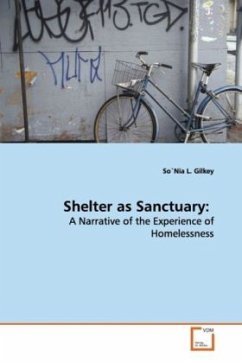What is the meaning of homelessness and how does it
translate into a better understanding of what the
experience of homelessness represents? Exploring
the experiences of those who are homeless and the
meaning of those experiences is essential when
attempting to gain insight and improve service
response to those who are homeless.
What is revealed through the personal stories
suggest a need for sanctuary. It is during this
experience of sanctuary that interviewees come
to confirm,resist, and eventually maintain or
transform the accepted norm of what it means to
live in a homeless circumstance. The internalized
cultural self emerges as the dominant influence in
telling the story of homelessness, both on the part
of the interviewees and that of the author.
It is in this narrative, the beginning of an
alternative model for emergency shelter services,
where opportunties for sanctuary or respite are
discussed as key needs for those entering emergency
shelter. A proposed sanctuary model of service
intervention is presented.
translate into a better understanding of what the
experience of homelessness represents? Exploring
the experiences of those who are homeless and the
meaning of those experiences is essential when
attempting to gain insight and improve service
response to those who are homeless.
What is revealed through the personal stories
suggest a need for sanctuary. It is during this
experience of sanctuary that interviewees come
to confirm,resist, and eventually maintain or
transform the accepted norm of what it means to
live in a homeless circumstance. The internalized
cultural self emerges as the dominant influence in
telling the story of homelessness, both on the part
of the interviewees and that of the author.
It is in this narrative, the beginning of an
alternative model for emergency shelter services,
where opportunties for sanctuary or respite are
discussed as key needs for those entering emergency
shelter. A proposed sanctuary model of service
intervention is presented.

